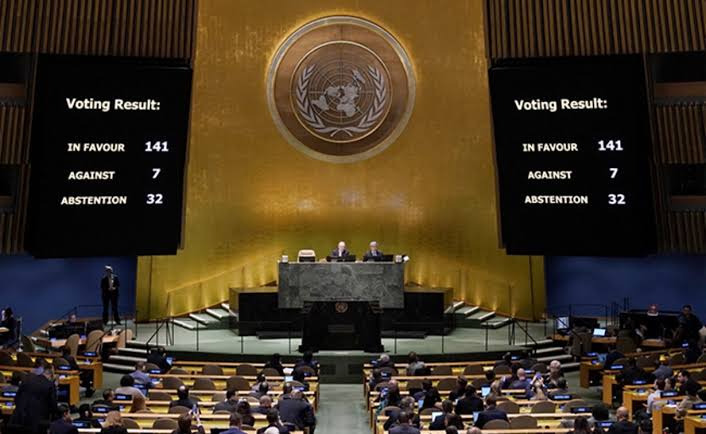The U.N. General Assembly approved a nonbinding resolution Thursday February 23, that calls for Russia to end hostilities in Ukraine and withdraw its forces, sending a strong message on the eve of the first anniversary of the invasion that Moscow’s aggression against it’s neighbour must stop.
The resolution, drafted by Ukraine in consultation with its allies, passed 141-7, with 32 abstentions.
Ukrainian Foreign Minister Dmytro Kuleba said the vote was more evidence that not only the West (Europe and the US) backs his country in it’s fight against Russia.
“This vote defies the argument that the global south does not stand on Ukraine’s side,” Kuleba said. “Many countries representing Latin America, Africa, Asia voted in favor.”
US national security adviser Jake Sullivan called the vote “an overwhelming demonstration of support for Ukraine and a clear defense of freedom for people everywhere.”
The General Assembly has become the most important U.N. body dealing with Ukraine because the Security Council, which is charged with maintaining international peace and security cannot carry out any actions due to Russia being a permanent members and carrying veto power.
General Assembly resolutions are not legally binding, unlike Security Council resolutions.
The seven countries voting against Thursday’s resolution were Belarus, Nicaragua, Russia, Syria, North Korea, Eritrea and Mali, which has developed close military ties with Russia.
Belarus tried to add some amendments that would have stripped much of the language but were resoundingly defeated by countries who voted against it.
The 193 member general assembly has held five vote since Russia sent troops and tanks across the border into its smaller neighbor on February 24, 2022.
Foreign ministers and diplomats from more than 75 countries addressed the assembly during two days of debate, with many urging support for the resolution that upholds Ukraine’s territorial integrity, a basic principle of the U.N. Charter that all countries must subscribe to when they join the world organization.
European Union foreign policy chief Josep Borrell told reporters that the aggressor and the victim can’t be put on equal terms. But China’s deputy U.N. ambassador, Dai Bing, told the assembly Thursday: “We support Russia and Ukraine in moving towards each other. … The international community should make joint efforts to facilitate peace talks.”
China says it is neutral in the conflict and an advocate of peace talks, but has not criticized the invasion or described it as such. Beijing has condemned the U.S. and its allies over sanctions on Moscow and military assistance to Ukraine. China and Russia have increasingly aligned their foreign policies to oppose the U.S.-led international order.
The war has killed tens of thousands on both sides and has reduced entire Ukrainian cities to ruins and its impact has been felt worldwide in higher food and fuel costs and rising inflation.


